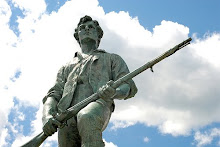[Excerpts from Common Sense and from Rights of Man regarding legislators]
...that the elected might never form to themselves an interest separate from the electors... On this depends the strength of government, and the happiness of the governed.
...a body of men, holding themselves accountable to nobody, ought not to be trusted by any body.
When money is to be obtained, the mass of variety apparently dissolves, and a profusion of parliamentary praises passes between the parts. Each admires with astonishment, the wisdom, the liberality, and disinterestedness of the other; and all of them breathe a pitying sigh at the burdens of the Nation.
Whether a combination acts to raise the price of any article for sale, or the rate of wages, or whether it acts to throw taxes from itself upon another class of the community, the principle and the effect are the same; and if the one be illegal, it will be difficult to shew that the other ought to exist.
It is from the power of taxation being in the hands of those who can throw so great a part of it from their own shoulders that it has raged without check.
...the portion of liberty enjoyed in England is just enough to enslave a country more productively than by despotism, and that as the real objective of all despotism is revenue, a Government so formed obtains more than it could either by direct despotism, or in a full state of freedom, and is, therefore, on the ground of interest, opposed to both.
[All courts and courtiers] form a common policy... detached and separate from the interest of Nations; and while they appear to quarrel, they agree to plunder.
What at first was plunder, assumed the softer name of revenue.
It is not because a part of the Government is elected, that makes it less despotism, if the persons so elected possess afterwards, as a Parliament, unlimited powers.
A man of moral honor and good political principles cannot submit to the mean drudgery and disgraceful arts by which such elections are carried. To be a successful candidate he must be destitute of the qualities that constitute a just legislator; and being thus disciplined to corruption by the mode of entering Parliament, it is not to be expected that the representative should be better than the man.








